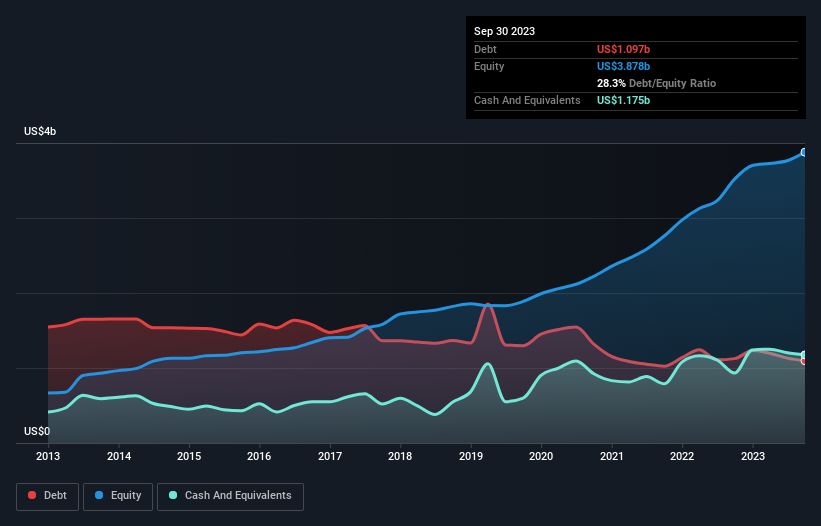
Howard Marks put it nicely when he said that, rather than worrying about share price volatility, 'The possibility of permanent loss is the risk I worry about... and every practical investor I know worries about.' It's only natural to consider a company's balance sheet when you examine how risky it is, since debt is often involved when a business collapses. We can see that Amkor Technology, Inc. (NASDAQ:AMKR) does use debt in its business. But the real question is whether this debt is making the company risky.
When Is Debt A Problem?
Generally speaking, debt only becomes a real problem when a company can't easily pay it off, either by raising capital or with its own cash flow. If things get really bad, the lenders can take control of the business. While that is not too common, we often do see indebted companies permanently diluting shareholders because lenders force them to raise capital at a distressed price. Of course, debt can be an important tool in businesses, particularly capital heavy businesses. When we think about a company's use of debt, we first look at cash and debt together.
See our latest analysis for Amkor Technology
What Is Amkor Technology's Debt?
As you can see below, Amkor Technology had US$1.10b of debt, at September 2023, which is about the same as the year before. You can click the chart for greater detail. But it also has US$1.17b in cash to offset that, meaning it has US$77.6m net cash.

A Look At Amkor Technology's Liabilities
We can see from the most recent balance sheet that Amkor Technology had liabilities of US$1.60b falling due within a year, and liabilities of US$1.25b due beyond that. On the other hand, it had cash of US$1.17b and US$1.41b worth of receivables due within a year. So it has liabilities totalling US$270.6m more than its cash and near-term receivables, combined.
Since publicly traded Amkor Technology shares are worth a total of US$6.99b, it seems unlikely that this level of liabilities would be a major threat. But there are sufficient liabilities that we would certainly recommend shareholders continue to monitor the balance sheet, going forward. While it does have liabilities worth noting, Amkor Technology also has more cash than debt, so we're pretty confident it can manage its debt safely.
The modesty of its debt load may become crucial for Amkor Technology if management cannot prevent a repeat of the 42% cut to EBIT over the last year. When it comes to paying off debt, falling earnings are no more useful than sugary sodas are for your health. When analysing debt levels, the balance sheet is the obvious place to start. But it is future earnings, more than anything, that will determine Amkor Technology's ability to maintain a healthy balance sheet going forward. So if you're focused on the future you can check out this free report showing analyst profit forecasts.
Finally, while the tax-man may adore accounting profits, lenders only accept cold hard cash. Amkor Technology may have net cash on the balance sheet, but it is still interesting to look at how well the business converts its earnings before interest and tax (EBIT) to free cash flow, because that will influence both its need for, and its capacity to manage debt. Looking at the most recent three years, Amkor Technology recorded free cash flow of 36% of its EBIT, which is weaker than we'd expect. That weak cash conversion makes it more difficult to handle indebtedness.
Summing Up
We could understand if investors are concerned about Amkor Technology's liabilities, but we can be reassured by the fact it has has net cash of US$77.6m. So we don't have any problem with Amkor Technology's use of debt. The balance sheet is clearly the area to focus on when you are analysing debt. However, not all investment risk resides within the balance sheet - far from it. For instance, we've identified 1 warning sign for Amkor Technology that you should be aware of.
Of course, if you're the type of investor who prefers buying stocks without the burden of debt, then don't hesitate to discover our exclusive list of net cash growth stocks, today.
New: Manage All Your Stock Portfolios in One Place
We've created the ultimate portfolio companion for stock investors, and it's free.
• Connect an unlimited number of Portfolios and see your total in one currency
• Be alerted to new Warning Signs or Risks via email or mobile
• Track the Fair Value of your stocks
Have feedback on this article? Concerned about the content? Get in touch with us directly. Alternatively, email editorial-team (at) simplywallst.com.
This article by Simply Wall St is general in nature. We provide commentary based on historical data and analyst forecasts only using an unbiased methodology and our articles are not intended to be financial advice. It does not constitute a recommendation to buy or sell any stock, and does not take account of your objectives, or your financial situation. We aim to bring you long-term focused analysis driven by fundamental data. Note that our analysis may not factor in the latest price-sensitive company announcements or qualitative material. Simply Wall St has no position in any stocks mentioned.
About NasdaqGS:AMKR
Amkor Technology
Provides outsourced semiconductor packaging and test services in the United States, Japan, Europe, and the Asia Pacific.
Flawless balance sheet and fair value.
Similar Companies
Market Insights
Community Narratives



